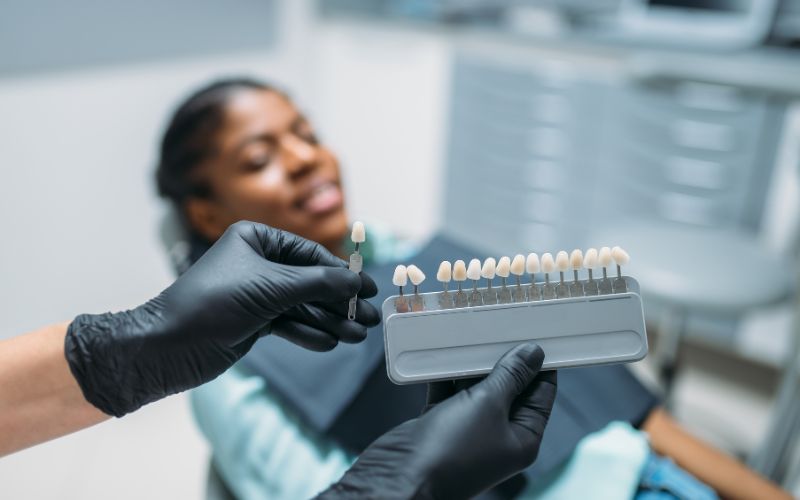1930 E. Rosemeade Pkwy #103 Carrollton, TX 75007


Dental veneers are a fantastic solution for enhancing your smile, providing a natural appearance and durability. However, occasional issues like a loose veneer can arise, causing concern and discomfort. Knowing what steps to take when faced with a loose dental veneer can alleviate stress and ensure timely resolution.
Understanding Dental Veneers
Dental veneers are thin shells, usually made from porcelain or composite resin, that are bonded to the front surfaces of teeth to improve their appearance. They can correct various imperfections such as chips, stains, or gaps, giving you a more uniform and attractive smile. Veneers are typically durable, but issues like loosening can occur due to various reasons.
Signs Your Dental Veneer May Be Loose
- Sensitivity: Increased sensitivity to hot or cold foods and beverages.
- Discomfort: Feeling a slight movement or wiggling of the veneer.
- Visual Inspection: Seeing a gap between the veneer and your natural tooth.
- Change in Fit: The veneer may feel different or loose when you bite down.
Steps to Take When Your Dental Veneer Comes Loose
Assess the Situation
When you notice that your dental veneer is loose, it’s crucial to evaluate the situation carefully:
- Do Not Remove It: Refrain from pulling or wiggling the veneer. Doing so can cause further damage to the veneer or potentially harm your tooth.
- Check for Discomfort: Assess any discomfort or sensitivity around the loose veneer. This can indicate whether there is an underlying issue that needs immediate attention.
Contact Your Dentist
- Schedule an Appointment: Call your dentist as soon as possible to schedule a visit. Explain the situation to ensure they prioritize your appointment, as a loose veneer can lead to more serious problems if not addressed promptly.
- Avoid Delay: Timely intervention can prevent complications such as tooth decay or damage to the natural tooth structure beneath the veneer.
Protect Your Tooth
- Avoid Hard or Sticky Foods: To prevent the veneer from dislodging further or causing discomfort, steer clear of hard, sticky, or crunchy foods until you see your dentist.
- Be Gentle with Cleaning: Maintain oral hygiene by brushing and flossing gently around the affected area. This helps avoid disturbing the loose veneer while keeping the area clean.
Temporary Measures
While waiting for your dental appointment, you can take temporary steps to manage the situation:
- Dental Wax: If the loose veneer feels sharp or uncomfortable, apply dental wax to provide a temporary buffer and protect your mouth.
- Over-the-Counter Dental Cement: Some pharmacies offer temporary dental cement, which can hold the veneer in place until your dentist Carrollton can see you. This is only a temporary solution and should not replace professional dental care.
Professional Assessment and Repair
- Evaluation: During your dental visit, the dentist will examine the veneer and the underlying tooth to determine the cause of the issue.
- Re-bonding: Often, the veneer can be cleaned and re-bonded to your tooth using dental adhesive.
- Replacement: If the veneer is damaged or cannot be re-bonded, your dentist may need to replace it entirely with a new one.
Preventative Measures and Long-Term Care
To prevent future issues with your dental veneers, adopt the following practices:
- Brush and Floss Regularly: Good oral hygiene is essential in reducing the risk of decay around the edges of your veneers.
- Avoid Excessive Force: Do not use your teeth to open packages or bite into hard objects, as this can stress the veneers and cause them to loosen or break.
- Regular Dental Check-ups: Visit your dentist every six months for routine examinations and cleanings. Regular check-ups help ensure that your veneers and natural teeth remain in good condition and that any potential problems are addressed early.
Experiencing a loose dental veneer can be unsettling, but knowing how to respond can prevent further issues and restore your smile quickly. By promptly contacting your dentist and following their advice, you can ensure the longevity and effectiveness of your dental veneers. Remember, maintaining good oral hygiene and seeking professional care is crucial for preserving your oral health and the appearance of your smile.
Whether you need a quick fix or a more involved procedure, your dentist is there to guide you through the process and restore your confidence in your smile. Don’t hesitate to reach out and address any concerns promptly—you’ll be back to enjoying your beautiful smile in no time!
For more information on dental veneers and oral health tips, feel free to explore our blog or contact us directly. Your smile deserves the best care possible!

